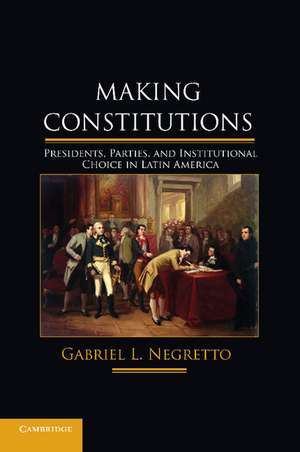Making Constitutions: Presidents, Parties, and Institutional Choice in Latin America
Autor Gabriel L. Negrettoen Limba Engleză Paperback – 16 iul 2014
| Toate formatele și edițiile | Preț | Express |
|---|---|---|
| Paperback (1) | 287.07 lei 6-8 săpt. | |
| Cambridge University Press – 16 iul 2014 | 287.07 lei 6-8 săpt. | |
| Hardback (1) | 719.39 lei 6-8 săpt. | |
| Cambridge University Press – 16 iun 2013 | 719.39 lei 6-8 săpt. |
Preț: 287.07 lei
Nou
Puncte Express: 431
Preț estimativ în valută:
54.93€ • 57.50$ • 45.72£
54.93€ • 57.50$ • 45.72£
Carte tipărită la comandă
Livrare economică 31 martie-14 aprilie
Preluare comenzi: 021 569.72.76
Specificații
ISBN-13: 9781107670983
ISBN-10: 1107670985
Pagini: 296
Ilustrații: 14 b/w illus. 26 tables
Dimensiuni: 152 x 229 x 17 mm
Greutate: 0.44 kg
Editura: Cambridge University Press
Colecția Cambridge University Press
Locul publicării:New York, United States
ISBN-10: 1107670985
Pagini: 296
Ilustrații: 14 b/w illus. 26 tables
Dimensiuni: 152 x 229 x 17 mm
Greutate: 0.44 kg
Editura: Cambridge University Press
Colecția Cambridge University Press
Locul publicării:New York, United States
Cuprins
Part I. The Logic of Constitutional Choice: Theory and Data: 1. Constitutional change and patterns of design; 2. A two-level theory of constitutional choice; 3. Determinants of variation in constitutional choice; Part II. Case Studies: The Origins of Reforms: 4. Constitutional change as a means to consolidate power: Argentina 1949; 5. Constitutional change as a strategy to redistribute power: Argentina 1994; 6. Constitutional change as a response to state failure: Colombia 1991; 7. Constitutional change as a remedy for ungovernability: Ecuador 1998.
Recenzii
'Gabriel Negretto challenges the traditional wisdom, largely inspired by the experiences of the United Kingdom and the United States, which conceives constitutions as stable frameworks for political action. With a focus on Latin America, he shows that constitutions can be as unstable as political parties and electoral behavior are in the region, thus making the choices of institutions endogenous to the political process. This work will be of interest to students of political institutions everywhere.' Josep Colomer, Georgetown University
'This is a terrific book. There are very few studies of institutional choice in Latin America, and fewer still grounded in both theory and careful on-the-ground research. The book shows that in unusual circumstances, when the whole political elite is threatened by widespread and sometimes violent opposition, constitution writers may cooperate across party lines to choose provisions expected to increase government efficiency and responsiveness. Most of the time, however, the partisan interests of constitution makers motivate revisions expected to help them win future elections and enact policies to benefit their supporters.' Barbara Geddes, University of California, Los Angeles
'Despite the fact that constitutional design in Latin America has occurred all too frequently, it is poorly understood. Negretto's volume elucidates the interaction of politics and environment in producing particular constitutional designs. Combining theoretical clarity, rigorous data analysis, and close readings of important cases, this book will be the state of the art for years to come.' Tom Ginsburg, Leo Spitz Professor of International Law, University of Chicago Law School
'This book explains the choices of institutions regarding presidential and congressional powers in post-1900 Latin America. Gabriel Negretto argues that parties choose rules that they expect to work to their own advantage and hence that the relative power of parties is key to understanding institutional choice. This is the most detailed examination of institutional choice that has been undertaken in Latin American politics, and perhaps in comparative politics as a whole.' Scott Mainwaring, Eugene P. and Helen Conley Professor of Political Science, University of Notre Dame
'Making Constitutions is a seminal book that sets a new standard for empirical legal scholars and for the political scientists concerned with institutional design. It is part of an emerging trend of scholarly work seeking to predict the content of constitutional rules … this volume will therefore serve as an exemplar for scholars interested in explaining other features of constitutional design in the years to come.' Anibal Perez-Linan, Journal of Latin American Studies
'Gabriel Negretto has produced a masterful book that helps us to understand constitutional politics in the region and beyond. Integrating quantitative analysis with a series of case studies, Negretto's innovative analysis makes this book required reading for students of constitutional design.' Political Science Quarterly
'This is a terrific book. There are very few studies of institutional choice in Latin America, and fewer still grounded in both theory and careful on-the-ground research. The book shows that in unusual circumstances, when the whole political elite is threatened by widespread and sometimes violent opposition, constitution writers may cooperate across party lines to choose provisions expected to increase government efficiency and responsiveness. Most of the time, however, the partisan interests of constitution makers motivate revisions expected to help them win future elections and enact policies to benefit their supporters.' Barbara Geddes, University of California, Los Angeles
'Despite the fact that constitutional design in Latin America has occurred all too frequently, it is poorly understood. Negretto's volume elucidates the interaction of politics and environment in producing particular constitutional designs. Combining theoretical clarity, rigorous data analysis, and close readings of important cases, this book will be the state of the art for years to come.' Tom Ginsburg, Leo Spitz Professor of International Law, University of Chicago Law School
'This book explains the choices of institutions regarding presidential and congressional powers in post-1900 Latin America. Gabriel Negretto argues that parties choose rules that they expect to work to their own advantage and hence that the relative power of parties is key to understanding institutional choice. This is the most detailed examination of institutional choice that has been undertaken in Latin American politics, and perhaps in comparative politics as a whole.' Scott Mainwaring, Eugene P. and Helen Conley Professor of Political Science, University of Notre Dame
'Making Constitutions is a seminal book that sets a new standard for empirical legal scholars and for the political scientists concerned with institutional design. It is part of an emerging trend of scholarly work seeking to predict the content of constitutional rules … this volume will therefore serve as an exemplar for scholars interested in explaining other features of constitutional design in the years to come.' Anibal Perez-Linan, Journal of Latin American Studies
'Gabriel Negretto has produced a masterful book that helps us to understand constitutional politics in the region and beyond. Integrating quantitative analysis with a series of case studies, Negretto's innovative analysis makes this book required reading for students of constitutional design.' Political Science Quarterly
Notă biografică
Descriere
Examines constitutional change in Latin America from 1900 to 2008 and provides the first systematic explanation of the origins of constitutional designs.
















